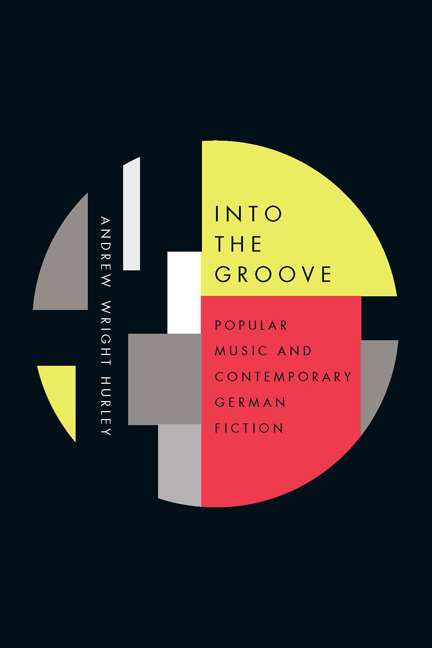Book contents
- Frontmatter
- Dedication
- Contents
- Acknowledgments
- Introduction
- 1 Preludes and Returns: Popular Music, the ʿ68 Generation, and the Literarization of the Jukebox
- 2 Enter the Double Agent: The German Popular Musician as Novelist
- 3 Techno-Lit: Electronica and Its Impacts on Fiction
- 4 Analogue is Better: Rock- and Pop-centric Literature
- 5 After the GDR's “Musical Niche Society”? Popular Music in the Literature of Thomas Brussig
- 6 The Gendering of Popular Music in the Novels of Karen Duve and Kerstin Grether
- Conclusion: Out of the Groove?
- Bibliography
- Index
2 - Enter the Double Agent: The German Popular Musician as Novelist
Published online by Cambridge University Press: 05 May 2015
- Frontmatter
- Dedication
- Contents
- Acknowledgments
- Introduction
- 1 Preludes and Returns: Popular Music, the ʿ68 Generation, and the Literarization of the Jukebox
- 2 Enter the Double Agent: The German Popular Musician as Novelist
- 3 Techno-Lit: Electronica and Its Impacts on Fiction
- 4 Analogue is Better: Rock- and Pop-centric Literature
- 5 After the GDR's “Musical Niche Society”? Popular Music in the Literature of Thomas Brussig
- 6 The Gendering of Popular Music in the Novels of Karen Duve and Kerstin Grether
- Conclusion: Out of the Groove?
- Bibliography
- Index
Summary
Although the term “pop” fell out of favor with many in the German literary field during the early 1970s, it continued to have a life in the music scene, initially designating a genre conceived of as an “other” to rock. Then, in the wake of socio-musical developments in the late 1970s and early 1980s, which saw the bombastic “progressive rock” of the day challenged by punk and postpunk, the term “pop” was reinvested with meaning. As Ralf Hinz and others have shown, the term was used with new vigor in the postpunk and new wave era, and in Germany reached a high point during the so-called pop summer of 1982. This usage is associated, in particular, with Sounds, which was edited at the time by Diedrich Diederichsen, as well as with Spex, founded 1980 and later edited for many years by Diederichsen. These magazines were the vanguard of advanced music journalism in West Germany, a milieu that reconceived the ways in which popular music was discursively mediated, and in turn proved to be rather productive as a breeding ground for various individuals who would later emerge or come into their own as literary aspirants.
The purpose of this chapter is to turn the focus to this younger generation of postpunk socialized authors. Rather than examine some of their key thematic and aesthetic concerns—a matter to which I will turn in the next chapter—I will consider their postpunk habitus, and the ways in which certain figures have been able to carve out durable, dual careers between music and literature. We do need to register here that the popular musician-cum-novelist of whom I will speak is not an entirely new phenomenon, or, for that matter, an exclusively German one. Earlier epochs of German literature have had their own isolated “hybrid” figures. For example, Günter Grass was a semi-professional jazz musician in the early 1950s, and even after his career as a novelist took off, he continued to engage intermittently in jazz and literature type activities.
- Type
- Chapter
- Information
- Into the Groove?Popular Music and Contemporary German Fiction, pp. 49 - 72Publisher: Boydell & BrewerPrint publication year: 2015



